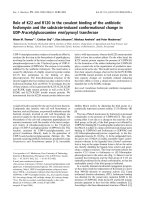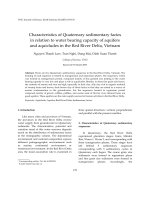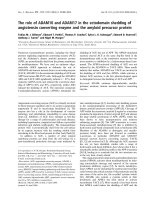An Often-Tumultuous Saga of Books and Book-Places in the World- A
Bạn đang xem bản rút gọn của tài liệu. Xem và tải ngay bản đầy đủ của tài liệu tại đây (646.62 KB, 3 trang )
University of Nebraska - Lincoln
DigitalCommons@University of Nebraska - Lincoln
E-JASL 1999-2009 (volumes 1-10)
E-JASL: The Electronic Journal of Academic
and Special Librarianship
Fall 2003
An Often-Tumultuous Saga of Books and Book-Places in the
World: A Review
Dayne Sherman
Southeastern Louisiana University
Follow this and additional works at: />Part of the Archival Science Commons, Communication Technology and New Media Commons,
Reading and Language Commons, Scholarly Communication Commons, and the Scholarly Publishing
Commons
Sherman, Dayne, "An Often-Tumultuous Saga of Books and Book-Places in the World: A Review" (2003). EJASL 1999-2009 (volumes 1-10). 34.
/>
This Article is brought to you for free and open access by the E-JASL: The Electronic Journal of Academic and
Special Librarianship at DigitalCommons@University of Nebraska - Lincoln. It has been accepted for inclusion in EJASL 1999-2009 (volumes 1-10) by an authorized administrator of DigitalCommons@University of Nebraska Lincoln.
Copyright 2003, the author. Used by permission.
ELECTRONIC JOURNAL OF ACADEMIC AND SPECIAL LIBRARIANSHIP
v.4 no.2-3 (Fall 2003)
An Often-Tumultuous Saga of Books and BookPlaces in the World: A Review
Dayne Sherman, Reference/Instruction Librarian
Southeastern Louisiana University
Battles, Matthew. Library: An Unquiet History. W.W. Norton, New York, NY,
2003. $24.95.
In this sweeping view of library history, Harvard librarian Matthew Battles provides a
beautifully written story of the often-tumultuous saga of books and book-places in the
world. Written first as an essay published in Harper's; this study grew into a booklength treatment, an admirable overview of the large issues facing libraries over the past
couple of thousand years.
The author draws liberally from a host of sources, relying repeatedly on his experiences
from years of working at Harvard University as an archivist. The story of how libraries
have evolved to the current state of organized chaos is interesting indeed. The problem
can be recognized by walking into the maze-like, labyrinth of the modern research
library, not unlike Harvard's 90-plus libraries with collections so vast and impenetrable
that the Myth of Sisyphus becomes an appropriate model for those who would try to
comprehend all of the information. These collections are staggering, though libraries,
as Battles explains in detail, were not always like what we now know as a library.
Library: An Unquiet History chronicles the library at Alexandria, as well as many other
libraries of antiquity, emphasizing the struggles to stave off fire and destruction, both
natural and human-spurned. It covers the development of books in various forms, and
the changing role of the library catalog in the overall scheme of library evolution. There
are many engaging, albeit sometimes disgusting, stories of the library as a tool of the
police state: author Richard Wright's now infamous journey into the white-only
southern libraries of his youth in the Jim Crow South, is one example.
The last century alone witnessed the destruction of 100 million books, for chiefly
political reasons. And this is an ongoing theme throughout the narrative. Another theme
besides book burning is the ideological shaping of libraries as pawns for political
purpose, the purveyors of propaganda. Both were present in Hitler's regime.
1
One riveting section of Library deals with the Nazi's censorship of books, and another
section recalls author Alfred Kazin's decent into the bowels of beauty and books in New
York Public Library circa 1929. Both stories are equally engaging, both profound for
very different reasons. The Nazis tried to censor and to shape German reading. Kazin,
an American Jew, did his best during the same period of World history, to drink deeply
from a free-flowing font of books and ideas in New York.
There are other problems that this study shows, perhaps by implication. First, Matthew
Battles, a librarian, is also a public intellectual. His words register because they are well
thought out and based upon a long tradition of research and synthesis in academe, but
not seen often enough among professionals called librarians. Battles has plenty to say
about history, the book, libraries, librarians, and the uncommon way in which these four
have evolved together. Indeed, this kind of book is relevant beyond its value for mere
bibliophile entertainment. As graduate library schools continue to close at an alarming
rate and as libraries and library managers undergo seismic shifts in mission and selfidentity, one way to address the many crises in librarianship is to reacquaint those of us
who work in libraries, as well as patrons who love the libraries, with the long-term
significance of the book and the library in human history.
The second real significance of this book is the vivid portrait painted of book-burning
over millennia. In essence, the totalitarianists know to strike the mind when attempting
to mold, or even obliterate a culture or an idea, whether during the Nazi atrocities in
Europe or with our current "Library Snooping Act" (the U.S.A. Patriot Act). Though
the U.S.A. Patriot Act is no moral equivalent to the Nazi atrocities by any means,
ultimately, monitoring one's reading, secretly no doubt, is but one step away from
closing the doors to the library itself, shutting the gate to the best of things librarians
and libraries stand for. It is an attempt at policing the mind. Do not be mistaken: those
who desire to police the mind will also police the body soon enough.
There are additional works of value to be read along with Library: An Unquiet History,
Lionel Casson's Libraries in the Ancient World and Fred Lerner's The Story of
Libraries: From the Invention of Writing to the Computer Age, among others. All of
this said, Library: An Unquiet History is a rare gem. If the American Library
Association cared much about the future of librarianship, it would buy every student in
an ALA accredited school a copy of this book, and it would also make an effort to see
that students actually read and discuss the work.
Library: An Unquiet History dignifies the work of librarians as a profession, something
needed more now than ever before, as we encounter this chaotic Communication Age.
It tells us why we are here toiling in the library by telling us how we arrived as keepers
of books and guardians of democracy.
Back to Contents
/>2









